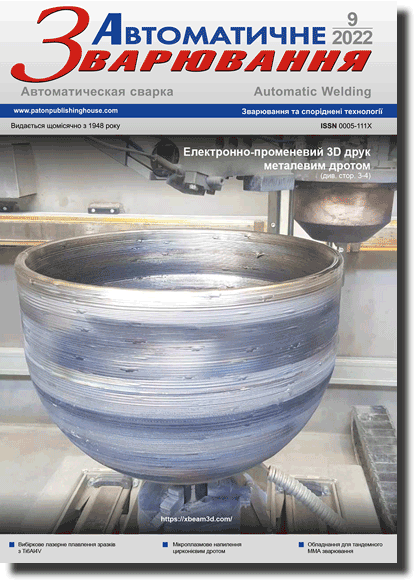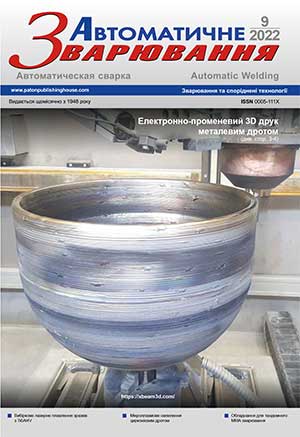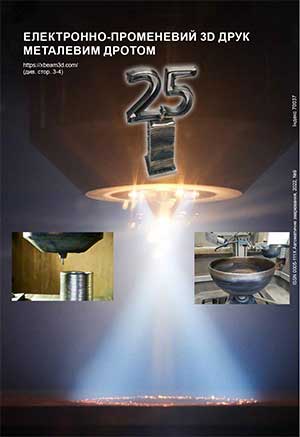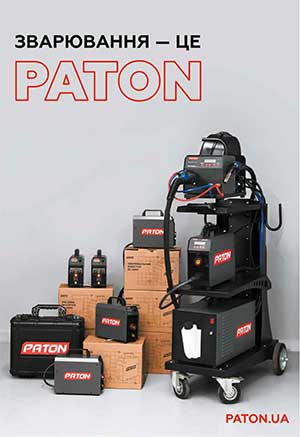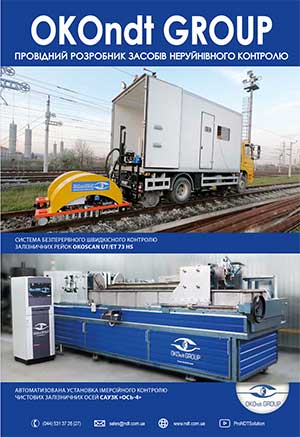| 2022 №09 (03) |
DOI of Article 10.37434/as2022.09.04 |
2022 №09 (05) |
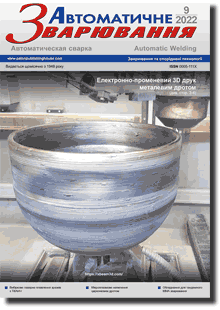
"Avtomatychne Zvaryuvannya" (Automatic Welding), #9, 2022, pp. 21-26
Influence of heat treatment of specimens from Ti6Al4V manufactured by the technology of selective laser melting on structure and mechanical properties
S.V. Adjamskiy1, G.A. Kononenko2, V.R. Podolskyi3
1LLC «Additive Laser Technology of Ukraine».31 v, Serhiy Podolynskyi Str., 49000, Dnipro, Ukraine. E-mail: info@alt-print.com
2Z.I. Nekrasov Iron and Steel Institute. National Academy of Sciences of Ukraine. 1 Academician Starodubov Sq., 49000, Dnipro, Ukraine. E-mail: office.isi@nas.gov.ua
3Ukrainian State University of Science and Technologies. 4 Gagarina Ave, 49000, Dnipro, Ukraine. E-mail: kaf.tom@metal.nmetau.edu.ua
Additive manufacturing, in particular, selective laser melting (SLM) is a modern method of manufacturing parts and assemblies of a complex geometry from metal powder, which are difficult or impossible to be reproduced in the states of traditional manufacturing. This technology is featured by residual stresses generated at the stage of manufacturing parts. Since titanium alloys are characterized by low thermal conductivity, the problem of forming residual stresses is of particular relevance for them and heat treatment for their removal is mandatory for products manufactured using SLM technology. Since the structural state of products manufactured by SLM technology differs from that formed with the use of traditional technologies, it is necessary to study the effect of annealing for residual stresses removal on mechanical properties and microstructure of Ti6Al4V alloy manufactured by SLM technology. The specimens were studied after annealing with an exposure time of 1...5 h at 800 °C. It was found that as compared to the initial state after manufacturing, ultimate strength after heat treatment for 1...5 h undergoes a decrease by 20.55...–23.03 %, relative elongation has an increase by 31.33...35.57 %. At the same time, the nature of variation in the values of relative reduction in area is non-uniform: annealing with an exposure of 1 h does not cause significant changes; with an increase in the exposure time to 2, 3, and 4 h, a decrease in this characteristics is observed, respectively, by 9.03; 45.97 and 62.56 % as compared to the initial state; after exposure for 5 h, the value of the relative reduction in area undergoes an increase in this characteristics as compared to the values after exposure for 4 h – by ~26.12 %. According to the results of the correlation analysis of the values of mechanical properties and microstructure parameters, it was found that the shape factor of α-phase plates has a high correlation with the values of ultimate strength, and the amount of α-phase is most correlated with the values of relative reduction in area during static tension. 7 Ref., 2 Tabl., 11 Fig.
Keywords: selective laser melting, heat treatment, titanium Ti6Al4V alloy, mechanical properties, microstructure
Received: 30.06.2022
References
1. Mahoney, M.W. (1989) Superplatic Properties of Alloy 718. Superalloy 718 Metallurgy and Applications. Eds. E.A. Loria, TMS, 391-405. https://doi.org/10.7449/1989/Superalloys_1989_391_4052. Conner, B.P., Manogharan, G P., Martof, A.N. et al. (2014) Making sense of 3-D printing; creation map of additive manufacturing products and services, Additive Manufacturing, 1-4, 64-74. https://doi.org/10.1016/j.addma.2014.08.005
3. Frazier, W.E. (2014) Metal additive manufacturing: a review. Journal of Materials Engineering and performance, 23, 6, 1917-1928. https://doi.org/10.1007/s11665-014-0958-z
4. Kruth, J.-P., Leu, M.-C., Nakagawa, T. (1998) Progress in additive manufacturing and rapid prototyping. CIRP Ann.-Manuf. Technol., 47, 2, 525-540. https://doi.org/10.1016/S0007-8506(07)63240-5
5. Adzhamskiy, S.V., Kononenko, G.А., Podolskyi, R.V. (2021) Influence of SLM-process parameters on the formation of the boundaries of parts of heat-resistant nickel alloy Inconel 718, Space Sci. & Technol., 27, 6, 105-114. https://doi.org/10.15407/knit2021.06.105
6. Adjamskyi, S.V., Kononenko, G.A., Podolskyi, R.V. (2020) Influence of technological parameters of SLM-process on porosity of metal products. The Paton Welding J., 10, 13-18 https://doi.org/10.37434/tpwj2020.10.03
7. Shifeng, W., Shuai, L., Qingsong, W. et al. (2014) Effect of molten pool boundaries on the mechanical properties of selective laser melting parts. J. Mater. Process. Tech-nol., 214, 11, 2660-2667. https://doi.org/10.1016/j.jmatprotec.2014.06.002
Advertising in this issue:
The cost of subscription/purchase order journals or individual articles
| Journal/Currency | Annual Set | 1 issue printed |
1 issue |
one article |
| TPWJ/USD | 384 $ | 32 $ | 26 $ | 13 $ |
| TPWJ/EUR | 348 € | 29 € | 24 € | 12 € |
| TPWJ/UAH | 7200 UAH | 600 UAH | 600 UAH | 280 UAH |
| AS/UAH | 1800 UAH | 300 UAH | 300 UAH | 150 UAH |
| AS/USD | 192 $ | 32 $ | 26 $ | 13 $ |
| AS/EUR | 180 € | 30 € | 25 € | 12 € |
| SEM/UAH | 1200 UAH | 300 UAH | 300 UAH | 150 UAH |
| SEM/USD | 128 $ | 32 $ | 26 $ | 13 $ |
| SEM/EUR | 120 € | 30 € | 25 € | 12 € |
| TDNK/UAH | 1200 UAH | 300 UAH | 300 UAH | 150 UAH |
| TDNK/USD | 128 $ | 32 $ | 26 $ | 13 $ |
| TDNK/EUR | 120 € | 30 € | 25 € | 15 € |
AS = «Automatic Welding» - 6 issues per year;
TPWJ = «PATON WELDING JOURNAL» - 12 issues per year;
SEM = «Electrometallurgy Today» - 4 issues per year;
TDNK = «Technical Diagnostics and Non-Destructive Testing» - 4 issues per year.




